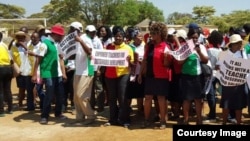As debate on the deployment of non-Ndebele speaking teachers in Bulawayo and Matabeleland continues, some locals say the Ministry of Education should address the situation quickly, while others say there is need for a proper scientific research into why students in the region perform poorly at Ordinary and Advanced Level compared to their counterparts elsewhere.
Bulawayo resident Iphithule Maphosa has a daughter in primary school. Maphosa says he has had to arrange for remedial studies for his daughter because she was not doing well in her Ndebele courses.
Maphosa, who is also the southern region spokesperson for ZAPU, says he subscribes to the view that the poor performance by students in Matabeleland in their Ordinary and Advanced Level examinations can be traced to their being taught by teachers that cannot speak IsiNdebele, the main language spoken in the region.
“As a parent, and together with many other parents in this region, we feel the main contributing factor is the deployment of non-Ndebele speaking teachers, especially in primary schools. I can give an example of my own daughter who was taught by a non-Ndebele speaking teacher from ECD up to Grade Two.
"Her Ndebele language was so bad to the extent that there was need for her to get extra lessons in order to pick up.”
POOR RESULTS
The debate on whether or not the deployment of non-Ndebele speaking teachers in Matabeleland has been going for a while now. The latest episode was sparked by the recent release of A Level results, showing that students in the region fared poorer than those in other regions across the country.
Parliament recently debated the issue of the deployment of non-Ndebele speaking teachers to Matabeleland.
Education Minister Lazarus Dokora said having a regulation that bars such deployment would be the same as segregating teachers on the basis of their mother language.
But Dokora’s pronouncement has not stopped the debate.
A student teacher, who want to remain anonymous, says it is important to have teachers who can speak pupils’ mother tongue, especially at primary school level.
“I think it is bad especially for children who are still in primary school because at some point in the teaching process, you will be compelled to use their mother language in order for them to understand things better.
“So if you are not conversant with that language, you won’t be able to use any other language except English and there will be a lot of misunderstanding. Most children in primary school don’t understand English so I think it is very important to have teachers who are fluent in the (local) vernacular.”
MEDIUM OF INSTRUCTION
But another Bulawayo resident, who only wants to be identified as Emilia, says she does not agree with this school of thought.
Emilia says since English is the medium of instruction as well as examination for all subjects, except the local languages, she doesn’t believe that having a non-Ndebele speaking teacher would necessary make students perform poorly.
A teacher, who does not want to speak on tape as he is not allowed to talk to the press, says Zimbabwe has in the past had expatriate teachers were unable to communicate in local languages but would still help people perform well in various exams.
The teacher adds that Zimbabwean educationists are highly rated in the region and have taught in neighbouring countries without necessarily being able to speak the native languages of people in those countries.
EDUCATION CHALLENGES
Former under-secretary in the Ministry of Education, Isaac Mpofu, who is also a prolific IsiNdebele author, says hunger is one of the factors affecting the level of education in Zimbabwe.
He says lack of IsiNdebele teachers in Matabeleland is also crippling education standards in the region.
Linguist and director Samukele Hadebe of the Public Policy Research Institute of Zimbabwe says from a purely academic point of view, it may not matter much what language a teacher speaks.
Hadebe says the debate on the issue of language is laden with some social, economic and political concerns that have been expressed by people in the region and there is need to discuss the issue openly but responsibly.
“More often when we debate the issues of language, we use it because it is manifest, but the deep-seated issues, the root causes which are socio-economic, political and power issues are never brought up. So, when people say in this area these are the results of a community that does not speak our language, we need to interrogate it and say what does it mean? Is it really about language or about other issues?”
Hadebe argues that instead of making simplistic conclusions there is need for
a thorough research on the problem of poor results in the Matabeleland region so that it can be adequately addressed.
Until the suggested research on the cause of poor examination results in the region has been carried out, people will continue to speculate.













